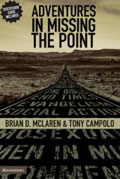Though I loved the MinistryCOM conference, my first impression was a groan.
When I registered, I was directed to choose one of four colored badge holders based on my church’s size. Blue for churches of under 1000, green for 1000-3000, yellow for 3000-5000, and red (I think it was) for churches above 5000. I, of course, took the blue one. Reluctantly. I hate pecking orders, and that’s what this sounded like.
Throughout the 1980s, I attended the Evangelical Press Association’s annual convention, a really big deal which brought together editors and staffs from several hundred evangelical publications, incuding all the biggies (like the Christianity Today family, Moody Monthly, Decision, Focus on the Family, etc.). I then edited a denominational magazine with less than 5000 subscribers. Denominational magazines were at the bottom of the pecking order, and 5000 subscribers was peanuts. Now, I had invitations to move to large, status publications, but I always felt God wanted me to remain with the United Brethren church. So I just sucked up the general disdain from the snooties.
But after a decade, I grew tired of being looked down on. The final straw came when I talked over lunch with an editor from The Banner, a prominent, award-winning denominational magazine for one of the Reformed denominations. The lady asked me who I worked for, and I told her. What’s your circulation? Five thousand. How large is your staff? It’s just me. Then she said, “Well, it must be very rewarding work.” While what I read between her words was, “Loser.” She then seemed bored talking with me, and turned her attention to others.
In reality, I knew I could write circles around her. I had three EPA writing awards to my name. I’d sold freelance articles to over 40 Christian publications. But because of size issues–denomination, circulation, staff–she considered herself a cut above me.
The editors from the big publications hung around each other, they ate together, they formed circles during break. Meanwhile, we little guys scattered around the edges, drinking coffee by ourselves, waiting for the next session to start. At meals, we filled in at tables with an extra chair.
I went to one more convention and stopped. I’d had enough with the status positioning, the snobbishness of the Big Boys (and Girls).
So, when I picked up my MinistryCOM name-badge holder, those old feelings came back. I represent a small church in a small denomination. I wouldn’t be considered a person with much to offer, just a peon coming to learn from the Biggies.
I asked one lady what church she was from, and her instincts immediately went to size. Her response was a chagrinned, “We’re not a large church.” Amused by her seeming sense of inferiority, I told her, “My church has 120 people. We’re a land-locked church plant.” She perked up and said, “Oh, we have a thousand people.” She paused, then said with a smile which humbly recognized the silliness of our dance, “I guess you win.”
So, I probably had the distinction of representing the conference’s smallest church (though I actually came representing my denomination, which was as big as two Christ’s Church of the Valleys).
But joy of joys, I experienced none of the snootiness I experienced in the Evangelical Press Association. Nobody paid attention to the color of your badge. We were all communications professionals serving the Lord. And I found that so extremely refreshing.


 Paula, my niece, highly recommended the book Adventures in Missing the Point, by Tony Campolo and Brian McLaren. Each chapter deals with a different topic–Doubt, Sin, Women in Ministry, Homosexuality, the Environment, Evangelism, etc. The two authors each wrote half of the chapters and briefly commented on the other person’s chapters.
Paula, my niece, highly recommended the book Adventures in Missing the Point, by Tony Campolo and Brian McLaren. Each chapter deals with a different topic–Doubt, Sin, Women in Ministry, Homosexuality, the Environment, Evangelism, etc. The two authors each wrote half of the chapters and briefly commented on the other person’s chapters. 


